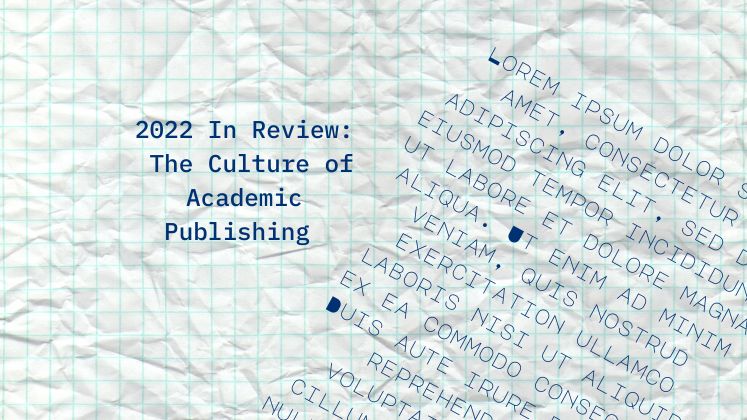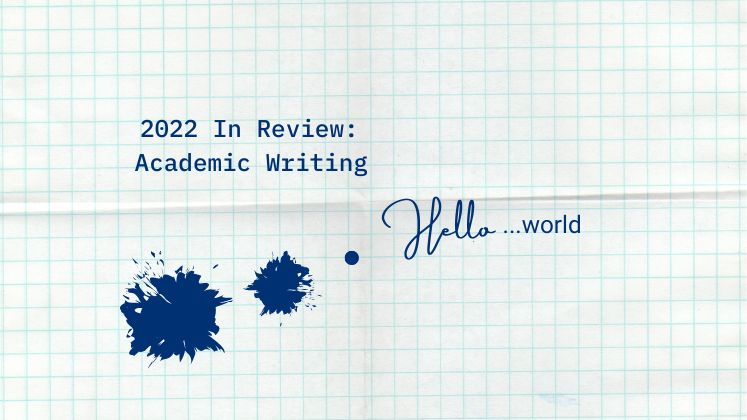From the war in Ukraine to the politics of citation, this annual review brings together twelve posts that explore issues in higher education and how they are shaped by the world within and without the ivory tower.
The responsibility of intellectuals in times of war
 War is a quintessentially social phenomenon that has provoked thinkers throughout history. Reflecting on the recent events in Ukraine and the history of realist thought on war, Paul Kelly, discusses intellectual responses to war and the inter-relationship of social thought with armed conflict.
War is a quintessentially social phenomenon that has provoked thinkers throughout history. Reflecting on the recent events in Ukraine and the history of realist thought on war, Paul Kelly, discusses intellectual responses to war and the inter-relationship of social thought with armed conflict.
Measuring the toll of COVID-19 on academic parents and what we can do about it
 The COVID-19 pandemic has impacted academic lives differentially, not the least of which, those who have lost relatives and live with the effects of the virus. For other groups, such as carers and academic parents, the pandemic has brought about a significant disruption to their working lives, but how exactly can this be accounted for? Discussing findings from an app-based momentary assessment of academic parents, Roxanna Nasseri Pebdani, shows how academic parents and especially mothers, have been disproportionately impacted by the pandemic and suggests ways in which higher education institutions should adapt to this reality.
The COVID-19 pandemic has impacted academic lives differentially, not the least of which, those who have lost relatives and live with the effects of the virus. For other groups, such as carers and academic parents, the pandemic has brought about a significant disruption to their working lives, but how exactly can this be accounted for? Discussing findings from an app-based momentary assessment of academic parents, Roxanna Nasseri Pebdani, shows how academic parents and especially mothers, have been disproportionately impacted by the pandemic and suggests ways in which higher education institutions should adapt to this reality.
Joining the Scientist Rebellion – Can research have impact without losing neutrality?
 As the world focuses its attention on COP-27 the question of what role science and researchers should play in driving the response to the Climate Crisis is central. As researchers in growing numbers subscribe to movements, such as Scientist Rebellion, Giuseppe Delmestri argues that researchers have a duty to take positions that align with their work, rather than hide behind claims to value-neutrality.
As the world focuses its attention on COP-27 the question of what role science and researchers should play in driving the response to the Climate Crisis is central. As researchers in growing numbers subscribe to movements, such as Scientist Rebellion, Giuseppe Delmestri argues that researchers have a duty to take positions that align with their work, rather than hide behind claims to value-neutrality.
An introvert’s guide to academic networking and hybrid events
 As academic conferences and events re-emerge after a period of COVID-19 induced absence, Mark Carrigan, takes stock of the new post-pandemic world of academic meetings and provides four strategies for how academics can productively navigate and build networks in a world of hybrid interactions.
As academic conferences and events re-emerge after a period of COVID-19 induced absence, Mark Carrigan, takes stock of the new post-pandemic world of academic meetings and provides four strategies for how academics can productively navigate and build networks in a world of hybrid interactions.
 Literature and in particular science fiction is often seen as being prefigurative to the development of science and technology. Whilst this can on occasion be the case, drawing on a study of AI researchers and their reading and viewing material, Sarah Dillon discusses how literature and other media can have structuring effects on the formation, research and communication practices of scientific communities.
Literature and in particular science fiction is often seen as being prefigurative to the development of science and technology. Whilst this can on occasion be the case, drawing on a study of AI researchers and their reading and viewing material, Sarah Dillon discusses how literature and other media can have structuring effects on the formation, research and communication practices of scientific communities.
Policy encourages researcher mobility, but it can be career dead end
 European research policies and national research systems encourage researchers, especially PhD and post PhD, to relocate and change institutions. However, discussing new research, Marco Seeber identifies a broken pipeline between those moving institutions and those going on to achieve senior positions that has serious implications for early career researchers. Exploring the reasons for this gap, he suggests how mobile early career researchers and institutions can be better integrated.
European research policies and national research systems encourage researchers, especially PhD and post PhD, to relocate and change institutions. However, discussing new research, Marco Seeber identifies a broken pipeline between those moving institutions and those going on to achieve senior positions that has serious implications for early career researchers. Exploring the reasons for this gap, he suggests how mobile early career researchers and institutions can be better integrated.
Changing the gender narrative with open access
 Academic success is regularly framed in terms of a particular set of publishing activities that disadvantages women. In this post, Katie Wilson and Lucy Montgomery discuss their recent research into how women researchers have pioneered the use of open access and the potential this could have for developing programmes that support more diverse and equitable forms of success for all researchers.
Academic success is regularly framed in terms of a particular set of publishing activities that disadvantages women. In this post, Katie Wilson and Lucy Montgomery discuss their recent research into how women researchers have pioneered the use of open access and the potential this could have for developing programmes that support more diverse and equitable forms of success for all researchers.
Rankings affect the financial sustainability of English universities, just not for the elite
 University rankings are often presumed to be value neutral, creating equal opportunities for the institutions they order to compete around fixed indicators of quality. However, highlighting new collaborative research, Roxana Baltaru shows how university rankings in the UK have differential effects, producing divergent incentives and pressures for institutions to respond to them.
University rankings are often presumed to be value neutral, creating equal opportunities for the institutions they order to compete around fixed indicators of quality. However, highlighting new collaborative research, Roxana Baltaru shows how university rankings in the UK have differential effects, producing divergent incentives and pressures for institutions to respond to them.
Aspirational metrics – A guide for working towards citational justice
 Is it possible to have a just politics of citation? Reflecting on their work to create a guide to fairer citation practices in academic writing, Aurélie Carlier, Hang Nguyen, Lidwien Hollanders, Nicole Basaraba, Sally Wyatt and Sharon Anyango, highlight challenges to changing citation practices and point to ways in which authors and readers can work towards equitable citations.
Is it possible to have a just politics of citation? Reflecting on their work to create a guide to fairer citation practices in academic writing, Aurélie Carlier, Hang Nguyen, Lidwien Hollanders, Nicole Basaraba, Sally Wyatt and Sharon Anyango, highlight challenges to changing citation practices and point to ways in which authors and readers can work towards equitable citations.
The Home Office plan for ‘high potential visas’ is no master card
 As the UK Home Office unveils plans to attract the “brightest and best” individuals to the UK, Johnny Rich outlines how using university league tables as a proxy measure to achieve this goal is unlikely to be successful.
As the UK Home Office unveils plans to attract the “brightest and best” individuals to the UK, Johnny Rich outlines how using university league tables as a proxy measure to achieve this goal is unlikely to be successful.
Is doing a PhD bad for your mental health?
 Poor mental health amongst PhD researchers is increasingly being recognised as an issue within higher education institutions. However, there continues to be unanswered questions relating to the propensity and causality of poor mental health amongst PhD researchers. Reporting on a new comparative survey of PhD researchers and their peers from different professions, Dr Cassie M Hazell and Dr Clio Berry find that PhD researchers are particularly vulnerable to poor mental health compared to their peers. Arguing against an inherent and individualised link between PhD research and mental health, they suggest institutions have a significant role to play in reviewing cultures and working environments that contribute to the risk of poor mental health.
Poor mental health amongst PhD researchers is increasingly being recognised as an issue within higher education institutions. However, there continues to be unanswered questions relating to the propensity and causality of poor mental health amongst PhD researchers. Reporting on a new comparative survey of PhD researchers and their peers from different professions, Dr Cassie M Hazell and Dr Clio Berry find that PhD researchers are particularly vulnerable to poor mental health compared to their peers. Arguing against an inherent and individualised link between PhD research and mental health, they suggest institutions have a significant role to play in reviewing cultures and working environments that contribute to the risk of poor mental health.
Stratification, Centralisation and the REF – The changing face of the UK university workforce
 Drawing on an analysis of HESA and case study data, Andrew Jenkins and Alison Wolf, explore the changing composition of the workforce in the UK higher education sector. Trends towards increased professionalisation and centralisation of roles, as well as specialisation in academic roles split between teaching and research were identified. They argue, rather than reflecting discrete strategies, these changes instead largely stem from external influences on higher education funding and evaluation.
Drawing on an analysis of HESA and case study data, Andrew Jenkins and Alison Wolf, explore the changing composition of the workforce in the UK higher education sector. Trends towards increased professionalisation and centralisation of roles, as well as specialisation in academic roles split between teaching and research were identified. They argue, rather than reflecting discrete strategies, these changes instead largely stem from external influences on higher education funding and evaluation.
The content generated on this blog is for information purposes only. This Article gives the views and opinions of the authors and does not reflect the views and opinions of the Impact of Social Science blog (the blog), nor of the London School of Economics and Political Science. Please review our comments policy if you have any concerns on posting a comment below.
Image Credit: Adapted from Jeswin Thomas via Unsplash.








